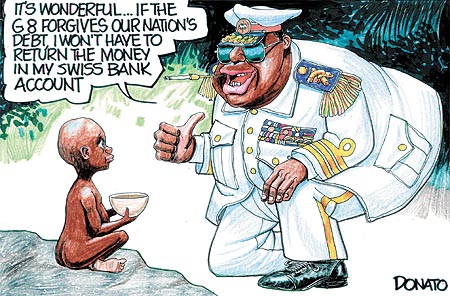Real Aid for Africa.

When I got back from ten months in Africa -- Egypt, Kenya, Tanzania, Zanzibar, Rwanda, Burundi, Malawi, South Africa, Namibia, Ethiopia, in that order -- I had a whole different take on the ethics of how the West conducts aid on the continent.
I remember a British friend in Egypt telling me that Africa would best be served if all the aid organizations, governmental and non-governmental, pulled off the continent. At first I was shocked. It's seemed to go against every humanitarian idea I had of priviledge and responsibility. But after my travels, I fully agreed with him and said the same thing, much to the horror of many of my friends, when I returned to the US.
More recently, I had a friend tell me that he was appalled by Obama's lack of assistance to his family in Kenya. When I replied that his point was non-sensical, saying that Obama's poor grandmother would have the entire village sitting on her doorstep, forced to dole out portions of her money to neighbors, officials, local politicians and businessmen, my friend thought I was cold-hearted. I'm not.
In the US, inequity is an institutionalized function of our traditionally white, male, priviledged, paternalistic government. Look at the two conversation in our media right now regarding financial employee bonuses, and who should get federal assistance for their over-priced morgages. Just yesterday, CNBC's Rick Santelli got a lot of attention for his "bootstraps" comments from the floor of the Exchange, namely from Gibbs, Obama's press secretary. Those at the bottom are kept at the bottom with lack of good education, health care, jobs, and other necessary resources. But that's here in the US.
The discussion of aid in Africa is much more complicated than institutionalized priviledge and our unique US idea of bootstraps.
What does poverty look like? Unless you've walked through the slums of a third world country, you don't know. A quick visit to New Jersey's food banks may tell you something about the US economy but you'll be no further along in your understanding of what African poverty looks like. Thankfully, we in the West have different standards of definition. That doesn't mean to take away from the folks short on their mortgages and scrimping to put their kids through school. But poverty is relative, not absolute.
Unless, or until, we're willing to engage in a more intelligent way with the complicated issues of aid on the continent, Western money will continue to be a cause and not a solution to Africa's scourges.
As Dambisa Moyo tells Deborah Solomon when asked, "What do you think has held back Africans?:"
I believe it's largely aid. You get the corruption -- historically, leaders have stolen the money without penalty -- and you get the dependency, which kills entrepreneurship. You also disenfranchise African citizens, because the government is beholden to foreign donors and not accountable to its people.
Other aid topics/areas that I should make the time to think (and write) more about:
Paternalism and the moral superiority of giving.
Faith-based initiatives in Africa.
Corporations and international ethics.
African governments and the politics of poverty.
Tourism and aid tourism.
Rwanda: a case study.
Labels: politics


0 Comments:
Post a Comment
Subscribe to Post Comments [Atom]
<< Home